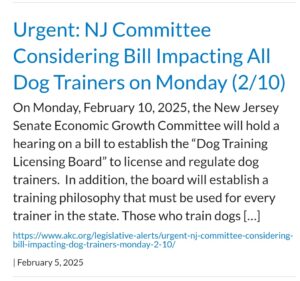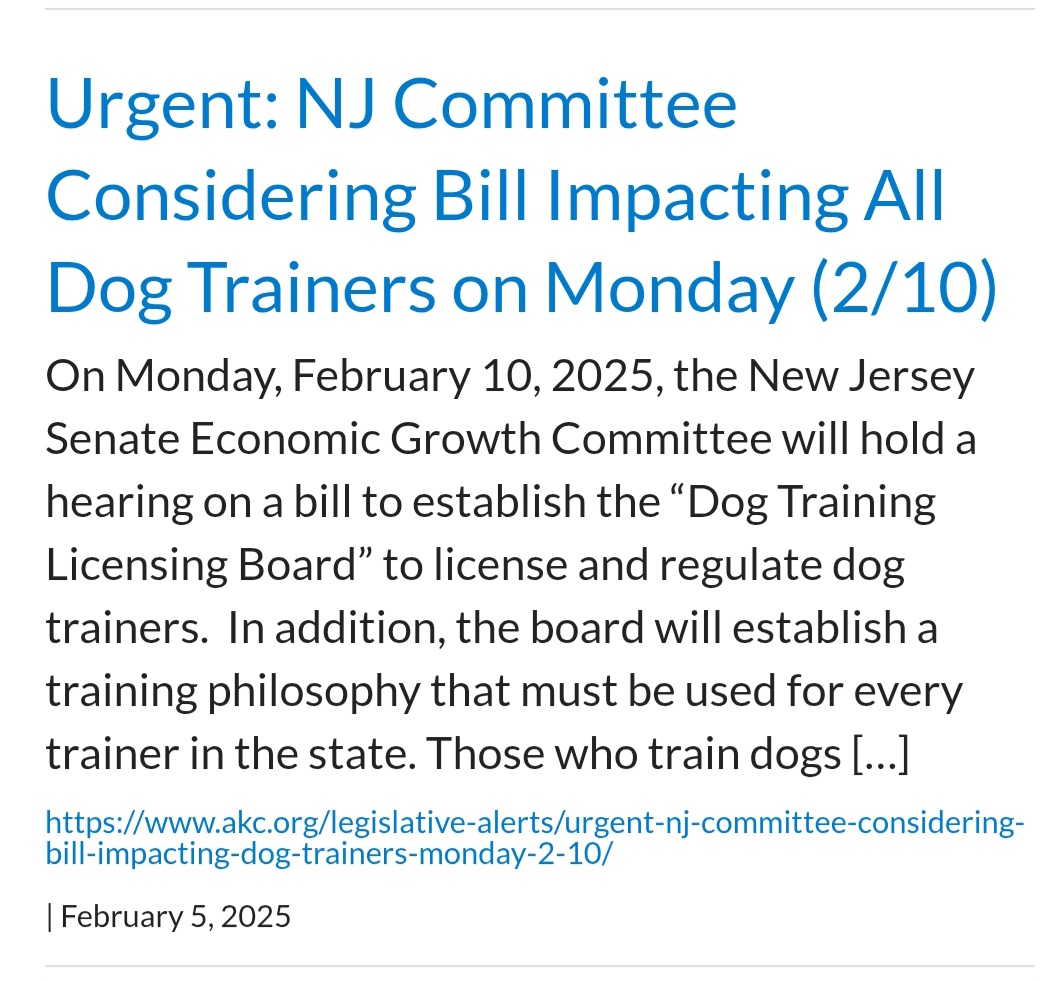 Critical Analysis of NJ SB 3814 Dog Trainer Licensing Bill: Flawed Policy with Unintended Consequences–
Critical Analysis of NJ SB 3814 Dog Trainer Licensing Bill: Flawed Policy with Unintended Consequences–
NJ SB 3814
NJ SB 3814 is proposed to establish a Dog Training Licensing Board and introduces significant regulatory changes to the dog training industry. While oversight can be beneficial in ensuring ethical and humane treatment of animals, this bill raises serious concerns regarding its scientific basis, economic impact, fairness, and practicality. This analysis will explore key issues with the proposed bill and why it may create more problems than solutions.
Flawed Scientific Basis
Misuse of “Evidence-Based” Standards
The bill mandates an “evidence-based, humane training code of practice” based on current welfare principles and veterinary behavioral science. However, much of the contemporary research cited in such regulatory efforts lacks rigorous scientific scrutiny. Many studies are survey-based, rely on owner-reported data, or are conducted with an inherent bias toward specific training methodologies. Scientific research must be reproducible, peer-reviewed, and free from agenda-driven narratives to serve as a reliable foundation for regulation.
Arbitrary Definition of “Aversive Training Methods”
The bill defines aversive training methods as practices that “deliberately cause pain, injury, or distress,” yet fails to specify objective criteria for what constitutes “distress.” Many commonly used training tools and methods—such as prong collars, e-collars, or leash corrections—can be applied in ways that are both humane and effective. The lack of clarity in defining “aversive” training allows for subjective interpretation, creating regulatory overreach that may punish competent trainers using ethical, results-based methods.
Existing Certification Programs Ensure Competency
Several professional organizations already set rigorous ethical and competency standards for dog trainers, including:
- National Association of Dog Obedience Instructors (NADOI) (est. 1965)
- International Association of Canine Professionals (IACP) (est. 1999)
These organizations provide standardized certification, continuing education, and accountability, ensuring trainers adhere to best practices without the need for government intervention. Instead of reinventing the wheel, legislators should consider recognizing these existing industry certifications rather than imposing redundant regulations.
Economic and Trade Restrictions
Unnecessary Financial Burdens
The proposed licensing structure would require trainers to pay for certification, licensing, and ongoing compliance measures, including:
- Fees for competency exams
- Costs for periodic updates to training methodologies
- Potential renewal fees following regulatory revisions
For independent trainers and small businesses, these expenses could impose an unreasonable economic burden, effectively acting as a restraint of trade. Such financial barriers may prevent qualified individuals from entering or continuing in the profession, ultimately limiting consumer choice and increasing the cost of training services.
Potential for Unfair Competition and Business Disruption
The bill provides a broad scope for investigating and disciplining trainers, opening the door for unethical competitors to use complaints as a means to target rival businesses. Without sufficient safeguards against frivolous or malicious complaints, legitimate trainers may find themselves unfairly penalized, leading to reputational and financial harm.
Discriminatory Exemptions and Economic Impact
Exemption for Police and Government Agencies
The bill exempts individuals who train police dogs or those employed by federal and state agencies. If aversive training methods are deemed unethical or harmful, why should government agencies be permitted to use them while private trainers are prohibited? This inconsistency highlights the arbitrary nature of the bill’s restrictions and raises concerns about fairness in application.
Impact on Dog-Related Events and Tourism
Dog training plays a crucial role in competitive dog sports, service dog preparation, and behavioral rehabilitation. Restricting training methodologies could have a chilling effect on these industries, discouraging participation in events that contribute significantly to New Jersey’s economy. Dog shows, competitions, and training seminars generate millions of dollars in tourism revenue each year, making the financial consequences of this bill far-reaching.
Underrepresentation of Professional Dog Trainers on the Licensing Board
The composition of the proposed Dog Training Licensing Board lacks adequate representation from practicing pet dog trainers. The board would include:
- Only two licensed trainers (with unclear eligibility criteria)
- A veterinary behaviorist
- An animal protection group representative
- Two public members
- A government-appointed official
Professional dog trainers—those who work daily with owners and dogs in real-world settings—should have a more significant role in shaping industry standards. The current board structure risks regulatory capture by organizations with ideological biases rather than practical experience.
Existing Animal Welfare Laws Already Address Cruelty
New Jersey already has well-established animal welfare laws prohibiting cruelty, abuse, and neglect. If the intent of this bill is to prevent inhumane treatment, then better enforcement of existing laws—not a sweeping licensing requirement—is the appropriate solution.
Conclusion: A Call for Practical and Inclusive Regulation
While oversight in any industry should aim to protect consumers and ensure ethical standards, this bill appears to be more about virtue signaling than meaningful reform. If New Jersey legislators genuinely wish to improve dog training standards, they should:
- Consult experienced dog trainers to craft fair, effective policies.
- Recognize existing certification programs instead of imposing unnecessary state licensing.
- Ensure fair board representation with a majority of working trainers.
- Base regulations on proven science rather than selective, agenda-driven studies.
- Provide clear definitions and protections against unfair enforcement.
By working collaboratively with industry professionals, lawmakers can create policies that support consumer protection and animal welfare without stifling competition, innovation, or economic opportunity.


